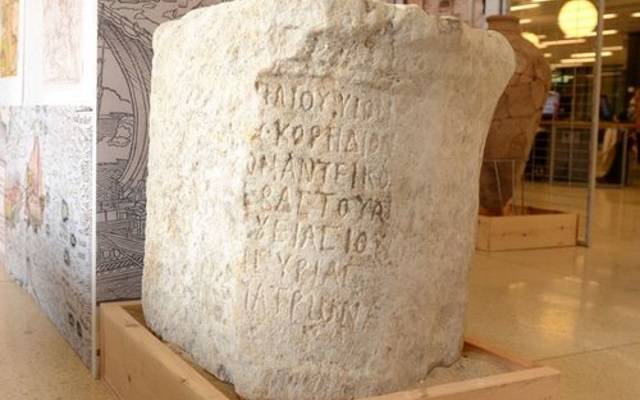The Land of Israel constantly reveals hidden treasures, testifying to its rich history. This time, archeologists deciphered a 2,000-year-old stone with one of the oldest-known mentions of the name Judea.
Israeli researchers from the University of Haifa have deciphered a rare inscription found on an underwater artifact, which sheds light on Roman rule over the province of Judea prior to the Bar Kokhba Revolt.
Archaeologists uncovered a massive rectangular stone bearing the name Gargilius Antiques during a maritime excavation at the Tel Dor archaeology site, which is located south of Haifa. The inscription enabled researchers to determine with certainty that Antiques was the Roman procurator who ruled over Judea just prior to the Bar Kochba Revolt.
“Not only did we manage to identify with certainty for the first time the name of the procurator that controlled Judea during the critical years before the Bar Kochba Revolt, but this is only the second time that a reference to the name Judea was revealed in any inscription from the Roman period,” University of Haifa’s Prof. Assaf Yasur-Landau and Dr. Gil Gambash said in a joint statement.
The Bar Kochba Revolt, was fought from 132-136 CE amid religious and political tensions following the failure of the revolt from 66-70 CE that led to the destruction of the Second Temple. The latter revolt—led by Shimon bar Kochba, who promised to restore Jewish independence— ended in a crushing defeat for the Jewish people that led to extensive Jewish depopulation in the land of Israel, as well as Roman efforts to erase any memory of Judea and ancient Israel.
While the name Gargilius Antiques was also found on an inscription uncovered more than 70 years ago, the portion of the inscription that indicated where he ruled was not preserved. Scholars debated whether or not Antiques was the procurator of Rome’s Syria province or Judea, but the new stone has clarified that debate.
“Immediately after suppressing the Bar Kochba Revolt, Rome decided to abolish the province of Judea, and erase all traces of its name, and as a result decided to connect it to Syria to create the province of Syria Palestina,” the University of Haifa researchers said. “So we see an inscription that dates back to very shortly before Judea essentially ceased existing as a province with this name. Out of the two inscriptions that mention the name Judea, this is of course the later one, but in light of its rarity, it is reasonable to assume that few other inscriptions with the name Judea from later on will be found.”
The Tel Dor coastal site where the inscription was found had operated as a major port until about the 4th century CE.
By: JNS.org
